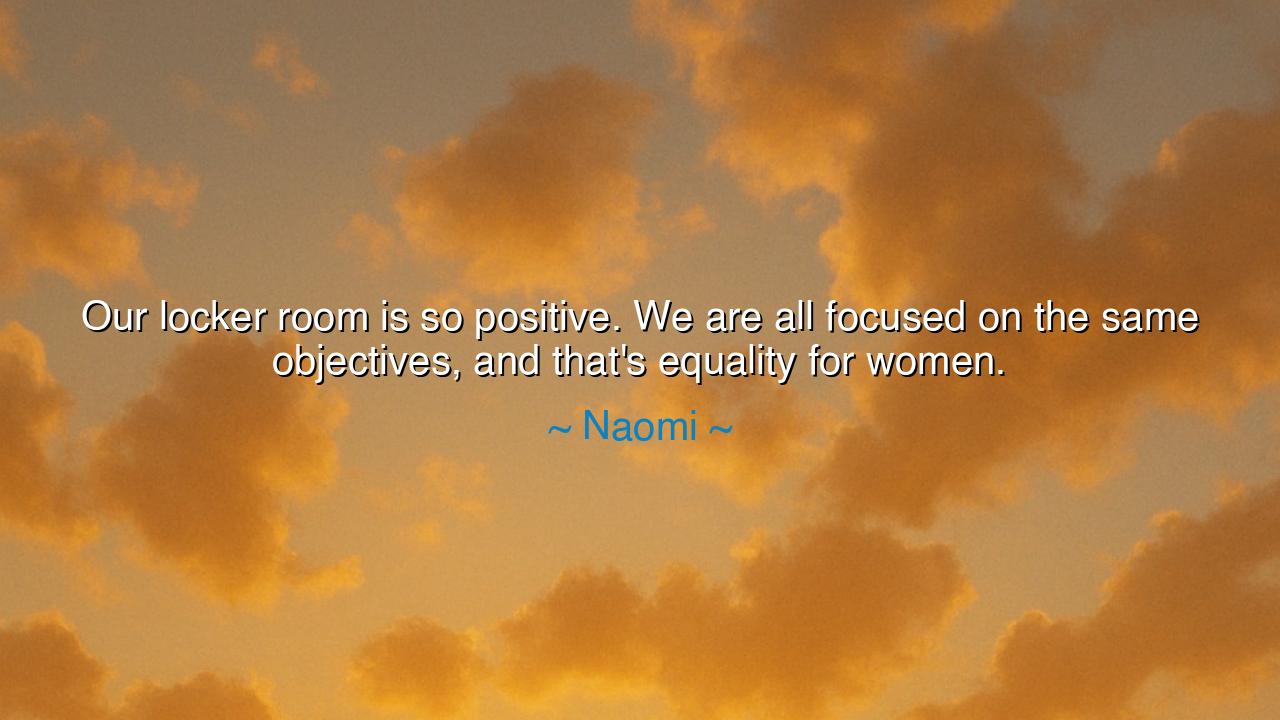
Our locker room is so positive. We are all focused on the same
Our locker room is so positive. We are all focused on the same objectives, and that's equality for women.






In the words of Naomi, athlete, champion, and bearer of quiet strength, we hear a truth radiant with unity and hope: “Our locker room is so positive. We are all focused on the same objectives, and that’s equality for women.” These words, simple yet powerful, echo like the chant of warriors before battle—not warriors of conquest, but of justice, of equality, of a world reborn in fairness. For in them, Naomi reveals that even in the most competitive of arenas, the greatest victory is not over opponents, but over the ancient forces that have long diminished the worth of women.
To understand the meaning of Naomi’s words, we must see beyond the walls of her locker room. That place, where athletes gather before and after struggle, becomes in her vision a temple of purpose—a forge where not only bodies, but ideals are strengthened. There, rivalry gives way to solidarity, and personal triumph yields to collective progress. When Naomi says, “We are all focused on the same objectives,” she speaks of something rare and sacred: sisterhood, born from shared hardship and sustained by shared hope. It is a call to unity in a world that has too often divided women against one another.
The origin of such unity lies in struggle. For generations, women in sport have battled unseen adversaries—dismissal, inequality, and the slow poison of being told they are less. In ancient Greece, where the Olympic Games first began, women were forbidden even to watch the contests, let alone compete. Yet centuries later, women like Babe Didrikson Zaharias, Serena Williams, and Naomi Osaka rose from the shadows to claim their rightful place in the arena. Each of them carried forward the same eternal flame: the belief that equality is not a favor to be granted, but a right to be reclaimed. Naomi’s words thus continue this lineage—a voice among many who have turned resistance into revolution.
Consider the story of Billie Jean King, who in 1973 stood upon the court against Bobby Riggs in the so-called “Battle of the Sexes.” The world watched not merely a tennis match, but a confrontation of eras—one rooted in arrogance, the other in awakening. When she triumphed, her victory was not just a personal one; it was a declaration that women’s skill, passion, and intellect needed no permission to exist. Naomi’s words are a reflection of that same legacy. Her locker room becomes a modern battlefield where camaraderie replaces competition, and victory is measured not in medals, but in the march toward equality for women.
What Naomi captures, in her quiet way, is the power of collective vision. Alone, a single voice may echo for a moment, but together, voices become an unbroken tide. When women stand united—when they refuse to compete for scraps of recognition and instead demand the whole harvest of justice—the world must listen. Her positivity is not naïve; it is defiant. It is the optimism of those who know that the path is long but the destination inevitable. For the flame of equality, once lit, cannot be extinguished—it burns through generations, reshaping all that it touches.
Yet her words also remind us of the sacred discipline required to maintain such unity. Positivity is not weakness—it is courage dressed in calm. It is easy to fall into bitterness, to let the weight of injustice turn to despair. But Naomi shows that progress is forged not only through anger but through endurance, through the unyielding belief that change must come. Within the laughter, the shared sweat, and the unspoken understanding of her team lies a quiet revolution—the refusal to be divided by fear or ego, the insistence that joy itself is an act of rebellion.
From her words, let the lesson be carried forth: greatness is never achieved in isolation. The fight for equality—be it in sport, in labor, or in life—demands that we lift one another rather than climb alone. Seek not to be first among many, but to rise with all. Speak encouragement where others sow doubt. Stand beside your sisters, your brothers, all who dream of fairness, and let your unity be your strength. For it is not enough to win the game; one must also change the field upon which it is played.
And so, Naomi’s quote becomes not just a reflection of athletes in a locker room, but a parable for all humankind. The locker room is the world itself—diverse, imperfect, full of struggle, yet filled with potential. If we, like her and her teammates, can learn to focus on the same noble objective—to see one another not as rivals but as partners in creation—then equality will no longer be a dream whispered in corridors of power, but a living truth sung in every heart. For when unity and purpose dwell together, even the smallest room can become the birthplace of a revolution.






AAdministratorAdministrator
Welcome, honored guests. Please leave a comment, we will respond soon